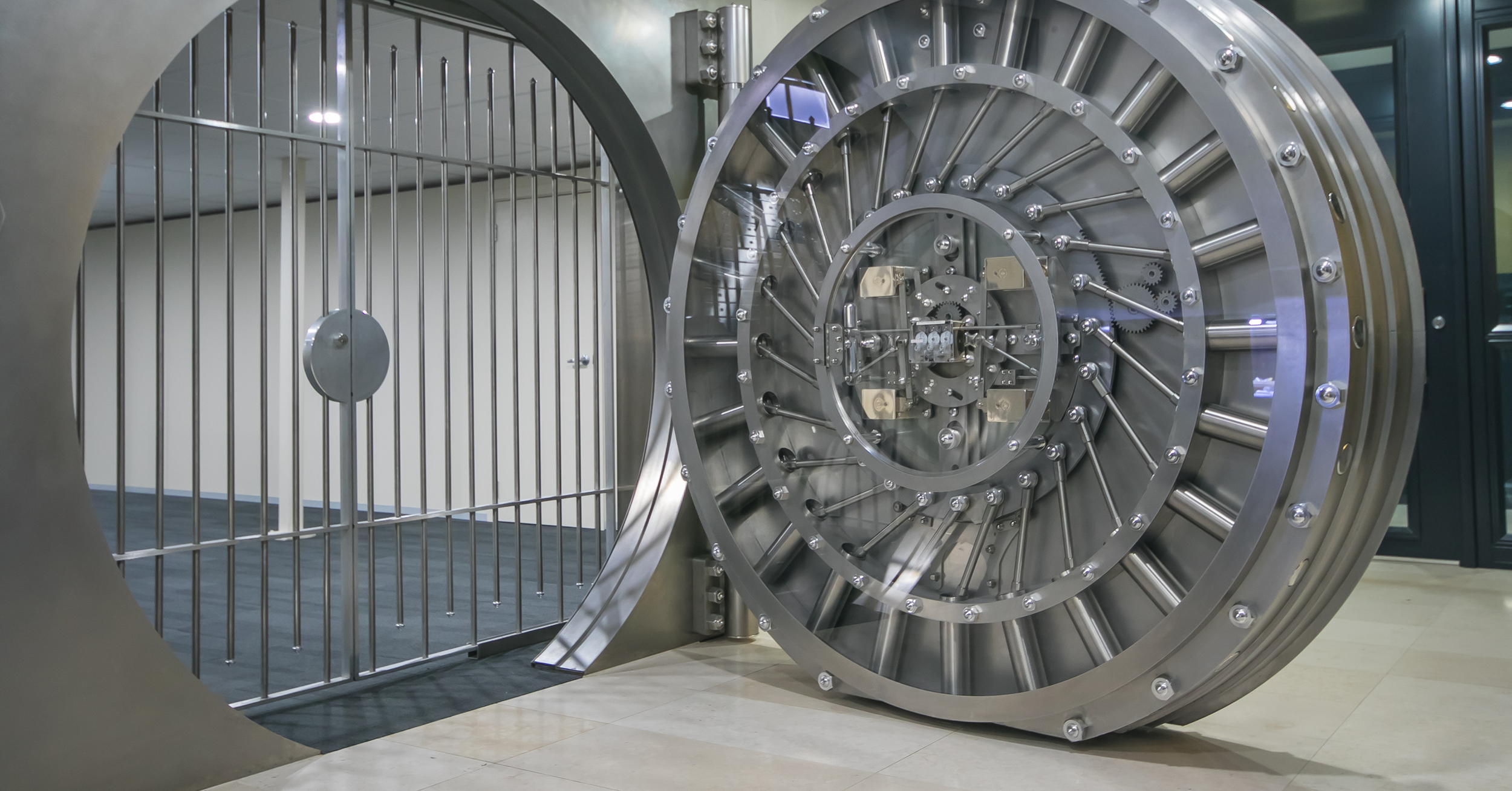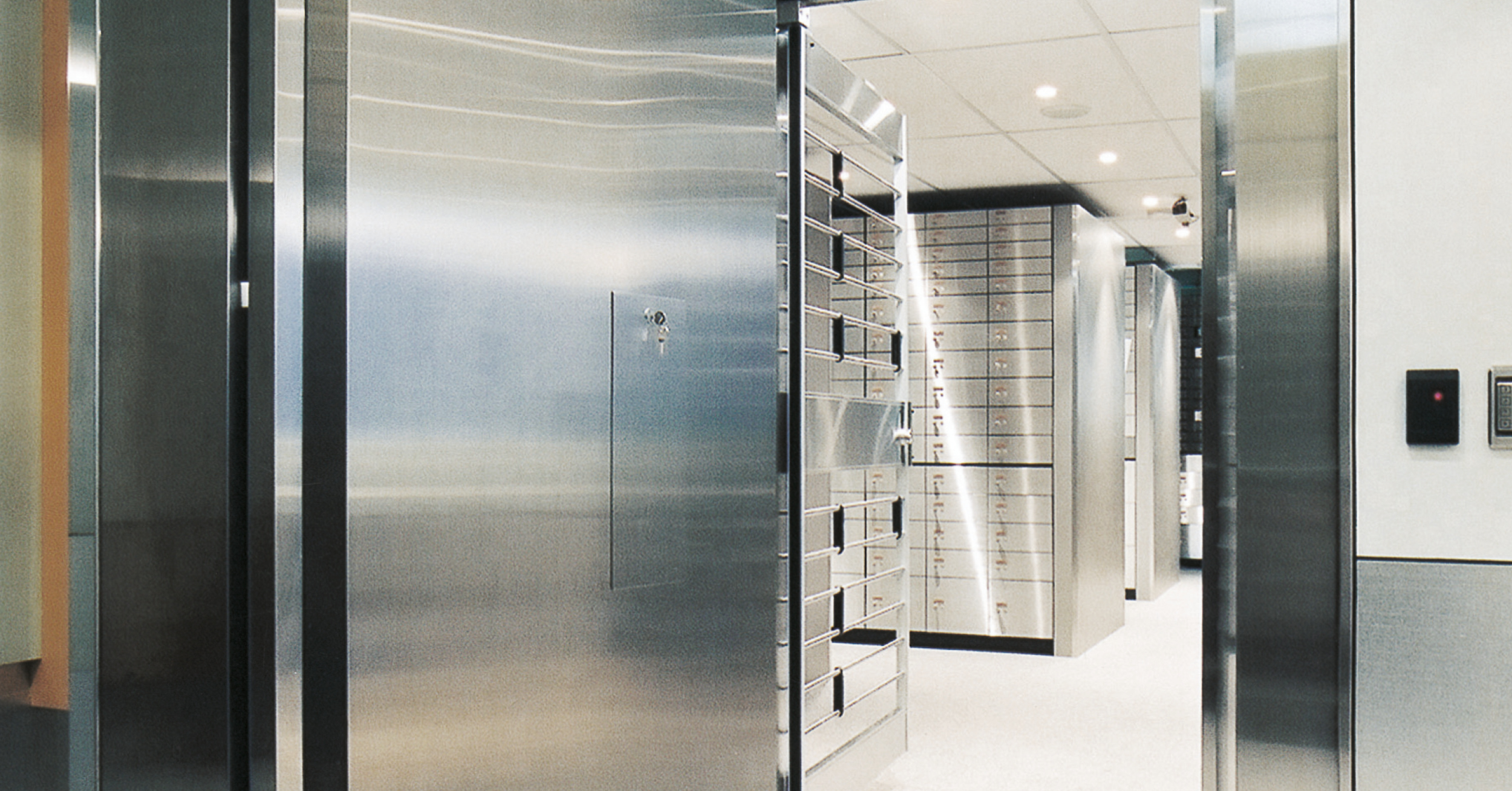
The entry to one of Guardian Vaults’ Sydney safe deposit rooms. Photo: Guardian Vaults
- Boom in self-storage units as more Australians take to apartment living
- Attention humans: I am Rosie, your robot security guard
It’s extremely hard to get into Neil Tremaine’s commercial properties in Sydney and Melbourne – but it’s even tougher to get out.
To enter, an unauthorised visitor has to make their way past guards asking for personal ID, photo-matching, a private digital pin code and a live hand-print scan – so much more exacting than mere fingerprints that can change over time, or can be sawn off dead bodies.
Then there are three locked, bullet-proof gates, an airlock ‘man-trap’ with 30-millimetre ballistic glass, and a 3.5-tonne, half-metre-thick steel vault door, with a time lock and four lock dials to which no one member of staff has all the combinations.
And that’s not to mention the battery of CCTV cameras being monitored constantly in three different locations, passive infrared sensors, seismic detectors, more security guards … and worse.
“If anyone did manage to get in, there’s a lot of other security we don’t talk about,” says Mr Tremaine. “Before long, you’d be lying on the floor dribbling out of the side of your mouth…”



So why are his commercial premises quite possibly the most secure in the country?
Because he’s the head of the company Guardian Vaults, operating Australia’s first, and largest, privately-owned safe custody facilities.
The Sydney premises are close to the late media magnate Kerry Packer’s magazine office from which, most famously, $5.4 million in gold bars were stolen from an antiquated safe in 1995 – a heist that was never solved.
“Yes, it astounds me that people would leave such wealth in their office, or even at home,” says Mr Tremaine, who started off in investment banking before moving into property development, then self-storage, and now a career that combines all three.
“Why put your wealth, yourself, or your family, at risk?
“We know some crimes have been committed where children have gone missing, with ransom notes left for people who have been known to keep large sums of cash, or other forms of wealth, at home. It’s always so much safer to have it stored securely in an independent, high-security facility.”
The popularity of specialist high-security safe deposit boxes is growing in Australia, and not just for billionaires and high-net-worth individuals.
Today as well as those wanting to store gold and silver bullion, they’re also in demand from people who want a place to store jewellery, family heirlooms such as their great-grandfather’s war medals, important documents, thumb-drives holding their photographs or cryptocurrency, and even, in some cases, sentimental treasures such as their late pet’s ashes.
There are women who want to lock their jewellery safely away from husbands with gambling habits, families with valuable gold wedding jewellery and people going overseas or who live in potentially dangerous areas. One of the busiest times for Guardian Vaults’ Melbourne facility was after the devastating Black Saturday bushfires in Victoria in 2009.



Traditionally, banks were the location for safe deposit boxes but now most are exiting the business and don’t want to invest so much money in updating old vaults, many of which date back to the early 1900s.
The global financial crisis, ironically, led to a huge lift in the fortunes of the high-security business.
“After the GFC, demand for physical forms of wealth, like gold, took over,” says Katherine Stevenson, sales executive for Guardian Vaults.
“A lot more people came to buy it and then store it with us. As a result, we also set up a dealing side of the business in precious metals so people could buy it here with insurance and not have the risk of physically carrying it from another place to here.”
It was a movement joined by many small businesses, farmers and investors operating their own self-managed super funds, too. Worried by the financial volatility of shares, anxious about what might happen to property markets, and mistrusting the banks – the vision of the Bank of Cyprus in 2013 seizing cash from its savers to keep itself afloat later spooked many more – they also moved into physical assets. Brexit, Trump, North Korea and the uncertainty about Spain’s future have only further increased demand.



There are new security safe deposit companies now springing up all around Australia but Guardian Vaults is the only company to operate multiple sites, with branches in Sydney and Melbourne CBDs. It’s also just opened a second location in Melbourne, in the basement of ANZ’s historic safe deposit building on Queen Street, with plans to expand to all the other capital cities.
A customer of Guardian Vaults, who spoke on condition she wasn’t named, says she’s been using the company’s safe deposit boxes for seven years, initially in Melbourne and then in Sydney when she later moved to that city.
“I simply wasn’t comfortable with leaving my valuables at home, and I tried the banks initially but they all had waiting lists,” says the 50-year-old business owner.
“I’d rather not say what I keep there, but as you can imagine, they are valuable enough for me to keep in a vault and have complete peace of mind.”
That’s often another draw of the facility, too: no customer needs reveal what they want to store in their boxes, whether the smallest boxes or the biggest ‘strong rooms’. It’s only if the Australian Federal Police have a warrant that the boxes are ever opened to anyone else.
In the meantime, Mr Tremaine reviews and upgrades the security every six months, studies any big heists around the world to see what went wrong.
“You look at any robberies to see how the robbers went about it,” Mr Tremaine says.
“Most traditional bank vaults were made over 100 years ago of concrete, so you can just slice through it with a drill you can hire from Kennards.
“At London’s Hatton Garden raid on a safe deposit company [in 2015 where up to £200 million of valuables were taken], for instance, they simply drilled through the vault. Our vaults are made of steel and compounds that are almost impossible to penetrate.
“And even if they were, we have so much other security, we’d catch anyone before they even had the chance to try.”
